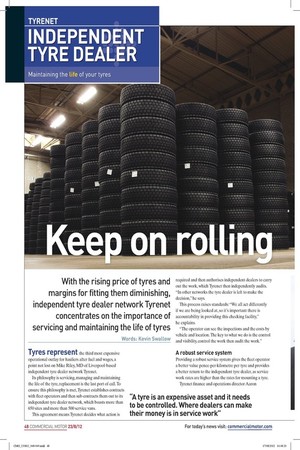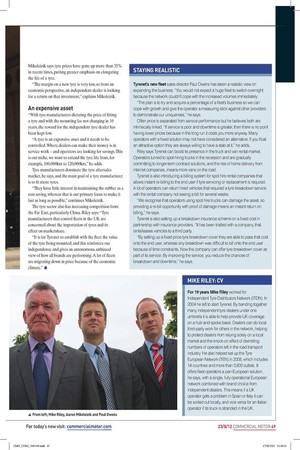Keep on rolling
Page 37

Page 38

If you've noticed an error in this article please click here to report it so we can fix it.
With the rising price of tyres and margins for fitting them diminishing, independent tyre deaLer network Tyrenet concentrates on the importance of servicing and maintaining the Life of tyres
Words: Kevin Swallow
Tyres represent the third most expensive operational outlay for hauliers after fuel and wages, a point not lost on Mike Riley, MD of Liverpool-based independent tyre dealer network Tyrenet.
Its philosophy is servicing, managing and maintaining the life of the tyre, replacement is the last port of call. To ensure this philosophy is met, Tyrenet establishes contracts with fleet operators and then sub-contracts them out to its independent tyre dealer network, which boasts more than 650 sites and more than 500 service vans.
This agreement means Tyrenet decides what action is required and then authorises independent dealers to carry out the work, which Tyrenet then independently audits. “In other networks the tyre dealer is left to make the decision,” he says.
This process raises standards: “We all act differently if we are being looked at, so it’s important there is accountability in providing this checking facility,” he explains.
“The operator can see the inspections and the costs by vehicle and location. The key to what we do is the control and visibility, control the work then audit the work.”
A robust service system
Providing a robust service system gives the fleet operator a better value pence-per-kilometre per tyre and provides a better return to the independent tyre dealer, as service work rates are higher than the rates for mounting a tyre.
Tyrenet finance and operations director Aaron Mikoleizik says tyre prices have gone up more than 35% in recent times, putting greater emphasis on elongating the life of a tyre.
“The margin on a new tyre is very low, so from an economic perspective, an independent dealer is looking for a return on that investment,” explains Mikoleizik.
An expensive asset
“With tyre manufacturers dictating the price of fitting a tyre and with the mounting fee not changing in 10 years, the reward for the independent tyre dealer has been kept low.
“A tyre is an expensive asset and it needs to be controlled. Where dealers can make their money is in service work – and operators are looking for savings. This is our niche, we want to extend the tyre life from, for example, 100,000km to 120,000km,” he adds.
Tyre manufacturers dominate the tyre aftersales market, he says, and the main goal of a tyre manufacturer is to fit more tyres.
“They have little interest in maintaining the rubber as a cost saving, whereas that is our primary focus to make it last as long as possible,” continues Mikoleizik.
The tyre sector also has increasing competition from the Far East, particularly China. Riley says: “Tyre manufacturers that control fleets in the UK are concerned about the importation of tyres and its effect on marketshare.
“It is for Tyrenet to establish with the fleet the value of the tyre being mounted, and this reinforces our independence and gives an autonomous, unbiased view of how all brands are performing. A lot of fleets are migrating down in price because of the economic climate.” n
stAying reAlistic
Tyrenet’s new fleet sales director Paul Owens has taken a realistic view on expanding the business. “You would not expect a huge fleet to switch overnight because the network couldn’t cope with the increased volumes immediately.
“The plan is to try and acquire a percentage of a fleet’s business so we can cope with growth and give the operator a measuring stick against other providers to demonstrate our uniqueness,” he says.
Often price is separated from service performance but he believes both are intrinsically linked. “If service is poor and downtime is greater, then there is no point having lower prices because in the long run it costs you more anyway. Many operators with a fixed solution may not have considered an alternative. If you float an attractive option they are always willing to have a stab at it,” he adds.
Riley says Tyrenet can boost its presence in the truck and van rental market. Operators turned to spot-hiring trucks in the recession and are gradually committing to longer-term contract solutions, and the rise of home delivery from internet companies, means more vans on the road.
Tyrenet is also introducing a billing system for spot hire rental companies that allows instant re-billing to the end user if tyre servicing or replacement is required. A lot of operators can return hired vehicles that required a tyre breakdown service with the rental company not seeing a bill for several weeks.
“We recognise that operators using spot hire trucks can damage the asset, so providing a re-bill opportunity with proof of damage means an instant return on billing,” he says.
Tyrenet is also setting up a breakdown insurance scheme on a fixed cost in partnership with insurance providers. “It has been trialled with a company, that rents/leases vehicles to a third party.
“By setting up a fixed price tyre breakdown cover they are able to pass that cost
Duiscil irit dolestrud tat sismod tet ut il ercip
onto the end user, whereas any breakdown was difficult to bill onto the end user because of time constraints. Now the company can offer tyre breakdown cover as
nim quis nonsequis nonsequat et, veliq quis
part of its service. By improving the service, you reduce the chances of breakdown and downtime,” he says.
onsequis nuisi
MiKe riley: cV
For 19 years Mike Riley worked for Independent Tyre Distributors Network (ITDN). In 2004 he left to start Tyrenet. By banding together many independent tyre dealers under one umbrella it is able to help provide UK coverage on a hub-and-spoke basis. Dealers can do local third-party work for others in the network, helping to protect dealers from relying solely on a local market and the knock-on effect of dwindling numbers of operators left in the road transport industry. He also helped set up the Tyre European Network (TEN) in 2008, which includes 14 countries and more than 3,600 outlets. It offers fleet operators a pan-European solution, he says, with a single, fully operational European network combined with brand choice from independent dealers. This means if a UK operator gets a problem in Spain or Italy it can be sorted out locally, and vice versa for an Italian operator if its truck is stranded in the UK.








































